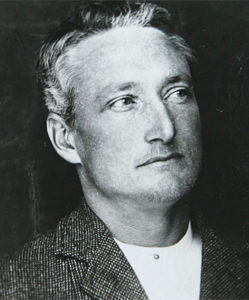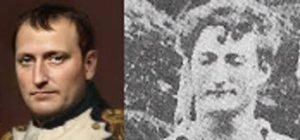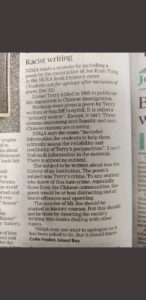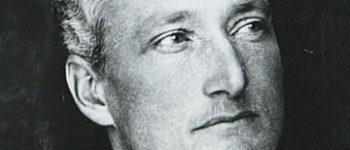1907: Emotional Insanity
December 22, 2020
By AHNZ
 Lionel Terry was not a New Zealander but he wanted to do something for New Zealand, and the Western World as a whole back in 1905. Brenton Tarrant had the same sentiments in 2019. Both men sought to ‘wake up’ the country they were passing through and had concluded that an object lesson was needed; Words would not do. Murder, then.
Lionel Terry was not a New Zealander but he wanted to do something for New Zealand, and the Western World as a whole back in 1905. Brenton Tarrant had the same sentiments in 2019. Both men sought to ‘wake up’ the country they were passing through and had concluded that an object lesson was needed; Words would not do. Murder, then.
On 24 September, 1905, in Wellington, Terry murdered an elderly Chinaman, Joe Kum Yung, with a bullet to the head. For the Englishman this was showing the courage of his convictions, and the convictions held by many New Zealanders and their politicians at the time in favour of racial purity or keeping New Zealand for New Zealanders. For example, Apirana Ngata had said the same thing a few years before lamenting the interbreeding with, “…low, vulgar, uneducated, degenerate pakeha…” and the loss of racial purity among Maori. The difference for Terry, as well as the Australian, Tarrant, was they were willing to kill innocent people to make a point.
Napoleon Complex
Terry, despite all his lobbying and circulating of his self-published pro-Anglo book The Shadow, could easily have escaped justice. Nobody identified him as the killer but Terry accused himself in a Wellington police station and was taken into custody. In court, Terry used the defence that Chinamen had no protection under English law and could therefore be slain with impunity! He had, he asserted, benefited the country and expected the law to recognise that with gratitude and appreciation.
“I wish to express my strong objection to His Majesty’s being placed in the position of a protector of unnaturalised race aliens in British possessions”- Terry’s opening defence¹
 Like Tarrant in 2019, Terry was willing to lay down his own freedom and even life in order to “arouse the people from a state of callous indifference.”² Both men wrote manifestos but only Tarrant’s ideas were ruthlessly suppressed by The State.
Like Tarrant in 2019, Terry was willing to lay down his own freedom and even life in order to “arouse the people from a state of callous indifference.”² Both men wrote manifestos but only Tarrant’s ideas were ruthlessly suppressed by The State.
Why did Terry think he would be celebrated? The roots of this were in his own father’s belief that the family descended from a French line going back to Napoleon Bonaparte himself. In English, the name ‘Thierry’ becomes ‘Terry’. The Terry family accepted that, like Baron de Thierry (‘Sovereign King of New Zealand’) their ancestor had fled to England from the French Revolution. Terry Snr believed his son, Edward Lionel, shared Napoleon’s determination and will and said so to the press after the murder. Lionel’s facial features, as well as his name, do also resemble ‘Leon the Emperor. If Bonaparte could rise to fame by killing civilians, why not he?
“This unfortunate individual was expected by the police to come round this way and two nights ago we had a couple of detectives here. The prevailing feeling for the pedestrian hereabouts seems to be one of sympathy, and the general desire is to extend to him the right hand of help, with the determination not to let the left know anything about it. Terry is suspected by most people to be as sane as the bulk of us. and a good deal saner than some.”- Otago Witness, 1907; Papers Past
Terry was almost right in thinking he would be a national hero. Sentenced to death, his momentum did secure him a pardon. Some 5,000 New Zealanders petitioned for him to go free as well. And, when he escaped, which he frequently did, Terry had plenty of grassroots support to help him evade re-capture.
Emotional Insanity
It was during a 3-week escape into the Otago back-country during November/December 1907 that Terry had published a poem called Emotional Insanity. It goes to show his public sympathy that it was published in so many outlets: Ohinemuri Gazette, Dunstan Times, Southland Times, Timaru Herald, Colonist, Christchurch Star, Wanganui Herald, Manawatu Standard, Taranaki Herald, Pahiatua Herald, Dominion, Waikato Argus, Hastings Standard, Greymouth Evening Star, NZ Truth, Marlborough Express,…
This poem has come to light again in 2020 because one of its verses, was used in the NCEA Level 2 history exam. Anticipating Michel Foucault in Madness and Civilization (1961) the author writes…
I
Oh, what a wondrous body is the medical profession!
‘Tis- difficult indeed to give our feelings due expression.
There’s nought so dark that mortal men may do, or think, or say,
That the doctors cannot diagnose and make as plain as day.
For instance: If a burglar breaks into your house at night,
And collars all your silver plate and gives your wife a fright,
And you shoot him in the interests of justice and humanity,
Why, you prove yourself a victim of emotional insanity.II
And if crowds of Russian Jews and Chows invade your peaceful land,
And spread a few diseases of an extra special brand;
And if they teach your boys and girls the latest things in vice,
And generally prevent your getting peace at any price;
And if at length you strike against a state of things chaotic,
And give free play to feelings ‘which are mainly patriotic —
Rash man! your action won’t fit in with modern Christianity,
Most clearly you’re the victim of emotional insanity.III
Again, if you should run across a hopeless renegade,
Who struts around and brags about the girls he has betrayed;
And if he makes a victim of your daughter or your wife,
You’d better cogitate a bit before you take his life.
For remember that, however strong may be the provocation,
You’ll stand a chance of forfeiting your mental reputation.
What ! — — the. doctors? Steady, man!
Don’t utter such profanity,
Why, that’s another symptom of emotional insanity.IV
Then raise your hat and bend your knees, and crawl in humble meekness,
Before these wondrous medicos who probe your mental weakness.
There’s not a thing that man has done since dawning of creation,
That the experts cannot classify as mental aberration,
And though it sounds suspiciously like blasphemy and libel,
Anent a little tragedy that’s mentioned the Bible,
They’ll glance above their spectacles, and state with calm urbanity,
That Holy Moses suffered from emotional insanity.
LIONEL TERRY. Seacliff, August 23rd, 1907.
Terry makes a profound point from within his cage, like a French-New Zealand Foucault, which is certainly apropos of 2020 NCEA level 2 history exam segment on Seacliff Asylum. What’s more, he did it in rhyme in a way resembling another celebrated work in Western Literature, Industrial Disease by Dire Straits (1982)
“The language of psychiatry is a monologue of reason about madness”- Foucault
“Somewhere in the corridors someone was heard to sneeze
Goodness me, could this be industrial disease?“History boils over, there’s an economics freeze
Sociologists invent words that mean “industrial disease”“Come back and see me later, next patient, please
Send in another victim of industrial disease””- Dire Straits
“Distracting, Offensive, Upsetting!”
Contrary to Terry’s ambitions, he is not currently remembered as a cherished hero but as an evil White Supremacist murderer. He is not depicted with an ordinary face but with a weird long-haired portrait, some cross between Vlad Dracula and Nathan Bedford Forrest. Instead of considering his ideas or critiquing his unethical methods the history revisionist point of view exiles this part of our history as Wrong Think. It’s a Bad Feel to be expelled. Only as of the last generation or two though and before that Terry was not the pariah our History Revisionists would have you think.
The NCEA history test, by including Terry’s remarks at all, trigger this emotional reaction because it’s not about the content of what is written but the identity of who is saying it that matters in the Victimhood Culture period we’re living in now. So…
“It is called a “primary source”. Except it isn’t….To any student who knew of this hate crime, especially those from the Chinese communities, the poem would be at best distracting and at worst offensive and upsetting.”- Colin Feslier, Island Bay; Letter to the Editor
Yes it is a primary source because it is a contemporary account of life in a madhouse in 1907 from someone within one. While this may well be distracting, offensive, and upsetting….well, so is New Zealand and all world history. If our scholars cannot learn to cope with that, especially those from the Chinese communities, then perhaps history is not for them, Colin.
“The poem’s subject was Terry’s crime..”- ibid
Actually, the subject was madness and criminality in general and the 1907 case of Harry Thaw shooting renowned architect Stanford White dead in New York City’s Madison Square Garden in front of hundreds of witnesses in particular.
“a systematic lack of responsiveness to diversity”- New Zealand Chinese Association president Richard Leung– Mandy Te, Stuff (12 Dec 2020)
Actually, including the voice of a ‘mad’ White Supremacist in the conversation rather than redacting his comments without considering their content is quite a diverse thing to do.
How someone can be ‘responsive’ to diversity is simply gobbledygook, as is the further adjective spiral (“systematic lack”) so I wont respond to that…as much as I’d enjoy it.
“..not been enough analysis and critical framing..“I would like [NZQA] to apologise,” she said…There were thousands of patients who went to Seacliff and it’s strange they went with him.”“- Cadence Chung, student; ibid
Miss Chung seems to want an up-front apology or disclaimer for using this primary source at all in a history paper. Something like “We are really sorry this is history, sorry this pertains to the topic. Sorry history isn’t nice. Sorry if you recognise that the author of the following passage did a really bad thing and let us assure you we all agree and have included a tear-out tissue section and teddy bear for you at the back of this exam paper to help you cope.”
And, in fact, it’s not strange that Terry’s widely circulated poem was not deliberately passed over for some other Seacliff inmate. Why should it be? Because history sources should only come from men who are not offensive?
What other famous person would you prefer? Did Janet Frame write on this topic or half as well? Would you prefer someone who was not famous or not educated at Eton and Oxford University? Someone less eloquent? You want your history facts safe and sanitised, pre-washed. But that’s not history for scholars that’s history for the primary school children’s library.
 “But I feel like including his testimonial dismissed his actions as ‘madness’ and extended sympathy to him, which I don’t want to do.”- Cadence Chung, Twitter
“But I feel like including his testimonial dismissed his actions as ‘madness’ and extended sympathy to him, which I don’t want to do.”- Cadence Chung, Twitter
A feeling is not an argument.
Chung doesn’t offer an argument, only that she feels like the NCEA is doing something she doesn’t want it to. Textbook Millennial mindset.
To include a voice is not to condone it, is not to sympathise with it, is not to minimise violent acts as mere sickness. If it were (as Victimhood Culture Millennials believe) the only solution would be to disclude and de-platform (and they do.)
Chung’s VC complaint is not rational, it’s feelings based avoidance and from this she has the media and the swarm marching in solidarity.
Chung is not really concered about feelings though but about avoiding processing her own. There’s no need to work, to think, to feel, to solve the complex issues. There’s no need to resolve Terry’s comments about madness or his crime or reconcile his wrongs and his rights. The Woke solution is to throw it all out the window at first sight like a hot potato rather than take on the task of an historian and figure things out. Don’t even need a rational excuse for that, just a feeling.
“The inclusion of a poem by an anti-Chinese extremist in an NCEA Level 2 History exam has raised concerns from students.”– Mandy Te, Stuff (16 Dec 2020)
What concerns?
(‘Concerns’ is a PC power word like ‘problematic’ or ‘offensive’ usually offered without facts or content. It’s an allegation of feeling; Of Wrong Think)
“Race Relations Commissioner Meng Foon says people setting exams should think about how students affected by racism could be impacted by the material featured in tests.”- ibid
He says ‘should think about’ but that’s more cautionary PC powerspeak. What he really means to do is reserve the territory of ‘thought’ for himself, saying his target is a non-thinker…
“Foon suggested people setting exams and teaching history should think carefully about how students from communities affected by racism could be impacted by material included in exams.”
Again, Foon says he’s the Thought Police and has caught someone in the act of non-thinking. After all, it’s his way or the highway. Not possible anyone has different views or values. There’s nothing to negotiate or debate. No sane person could possibly expect a history student to think carefully about how material impacts upon them, could they? That’s someone else’s job to do. To pre-chew history and spoon it into their student’s feed bowl…
“Also, against the backdrop of Black Lives Matter and the Christchurch Mosque terrorist attacks, engaging with those who have lived experience of discrimination and xenophobia is important.”- Foon
A ridiculous suggestion that history tests need to be altered to anticipate and manage the traumas and triggers of those who willingly accept the challenge of studying New Zealand history.
Why stop at xenophobia and discrimination? Ought examiners engage with students who are sensitive about war or are hydrophobic or even homophobic to ensure none of their prejudices or fears are hinted at in exam materials?
Such babysitting and lack of self-resilience is, Foon tells us, more important for students today because of contemporary challenges. As if the way to prepare and test competent history researchers is to always make sure they never need to cope with discoveries or facts about people being cruel or violent!
I wonder what Foon and Cadence Chung, 17, will do when they find out that not only have 17 year olds not normally been protected from upsetting history but that they were more often than not giving and receiving it!
—
1 Ref. p1838, New Zealand’s Heritage
2 ibid
Image ref. Archives NZ; Stuff (2011)
ref. Level 2 History 2020 Resource Booklet; nzqa.govt.nz
 Like Comment Share
Like Comment Share






